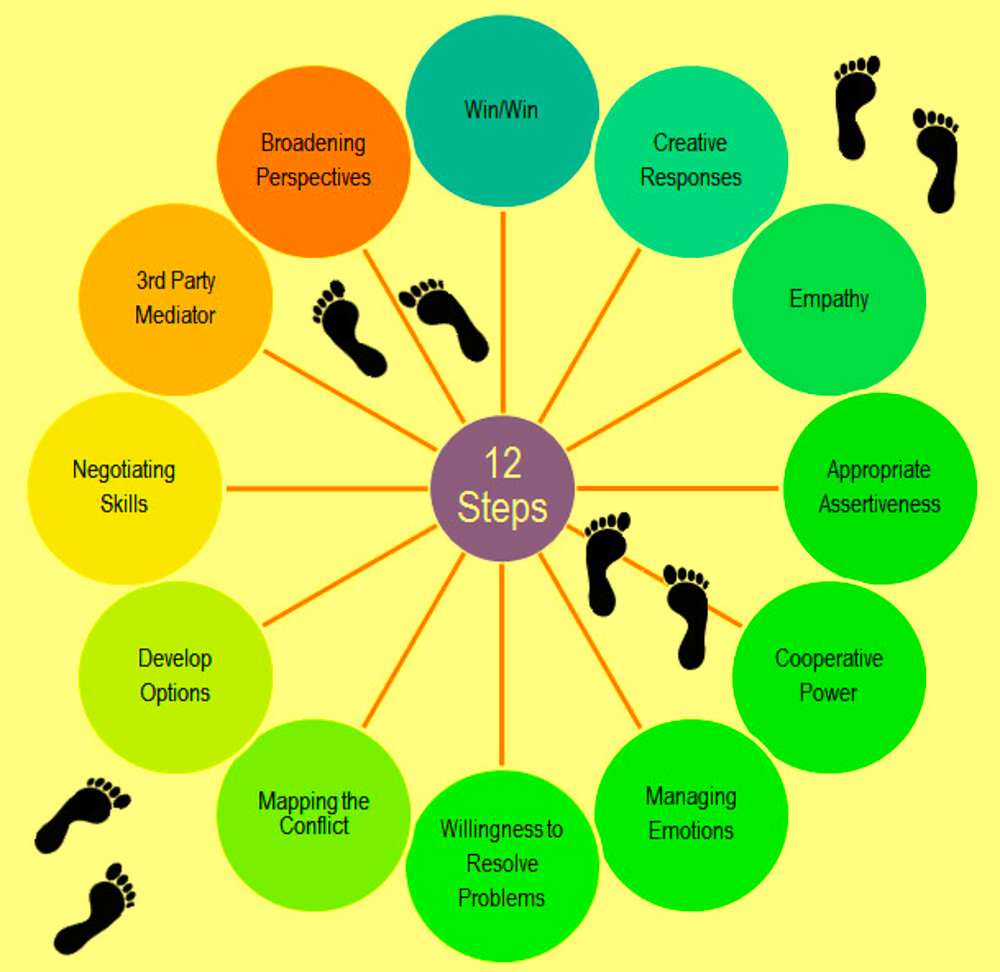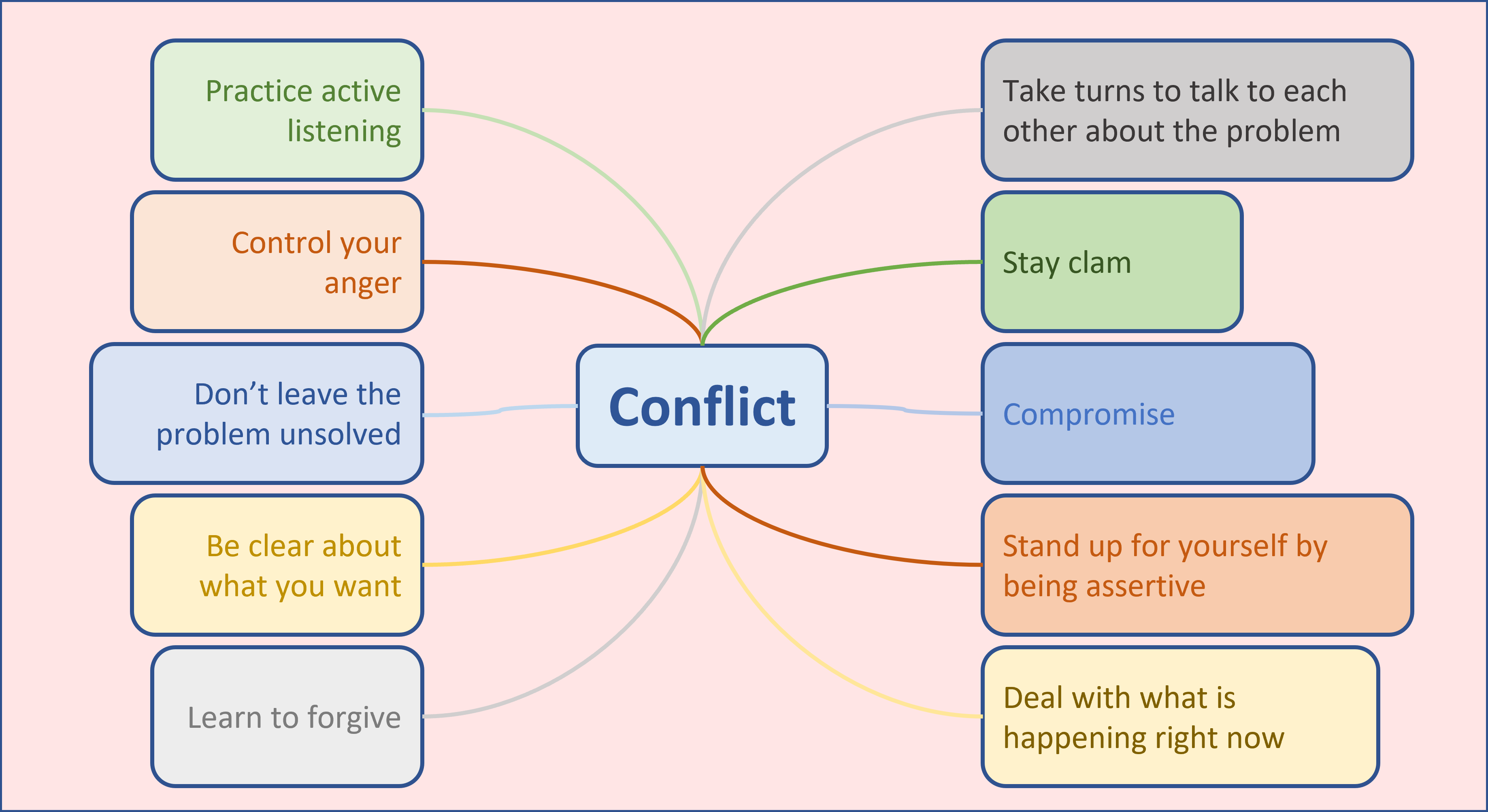.png)
Strategies
There are many techniques and recommendations for conflict management.Here are some of the most effective ones :
Active Listening: This is an essential skill for conflict resolution. It involves really listening to what the other person is saying without interrupting or judging them. This helps to build trust and empathy, which can lead to a better understanding of the conflict.
Collaboration: Collaboration involves working together to find a solution that meets the needs of both parties. This approach can be very effective in resolving conflicts because it encourages compromise and creativity.
Compromise: This involves finding a middle ground that both parties can agree on. It can be an effective strategy when both parties are equally invested in the outcome of the conflict.
Avoidance: Sometimes, the best way to resolve a conflict is to avoid it altogether. This may mean putting the conflict on hold until emotions have cooled down, or finding a way to work around the conflict without confronting it directly.
Mediation: Mediation involves bringing in a neutral third party to help the parties find a resolution to the conflict. This can be a very effective strategy when the parties are unable to resolve the conflict on their own.
Negotiation: Negotiation involves finding a solution that meets the needs of both parties through a process of give-and-take. This approach can be effective when both parties are willing to compromise.

Some recommendations for effective conflict management includes :
Start with clear communication: Before the conflict gets out of hand, make sure that all parties involved are communicating clearly and respectfully.
Address the conflict directly: Don't let conflicts fester. Address them as soon as possible, and work to find a resolution that is fair and respectful to all parties involved.
Stay objective: Try to see the conflict from all sides, and avoid taking sides or playing favourites. Staying objective will help you find a solution that is fair to all parties involved.
Be empathetic: Empathy is key to effective conflict management. Try to understand the other person's perspective, and communicate that you understand and care about their feelings.
Focus on the future: Rather than dwelling on past conflicts, focus on finding solutions that will help you move forward in a positive direction.
Use feedback: Encourage open communication and feedback from all parties involved, and use that feedback to adjust your approach as needed.
Be flexible: No two conflicts are the same, so be willing to adapt your approach to the situation at hand.

Focus on interests, not positions: Rather than focusing on each party's stated position, it can be helpful to identify their underlying interests. By understanding what each party wants and why they want it, you may be able to identify mutually beneficial solutions that meet both parties' needs.
Collaborate to find a win-win solution: Collaborative problem-solving involves working together to identify and implement a solution that meets the needs of all parties involved. This requires a focus on active listening, open communication, and a willingness to compromise and explore creative solutions.
Use assertive communication: Assertive communication involves expressing your needs and boundaries clearly and directly, while still respecting the needs and boundaries of others. This can help to prevent misunderstandings and defuse potential conflicts before they escalate.
Practice active listening: Active listening involves fully engaging with the person speaking, demonstrating that you understand their point of view, and providing feedback to show that you are actively engaged in the conversation. This can help to build trust and foster a more collaborative atmosphere.
Identify common ground: Even when parties seem to be in conflict, there may be areas of common ground that can be identified and used as a basis for building a collaborative solution. By finding areas of agreement and focusing on shared goals, it may be possible to find a solution that meets everyone's needs.
Seek out mediation or other third-party assistance: In some cases, it may be helpful to bring in a neutral third party, such as a mediator, to help resolve the conflict. A mediator can help to facilitate communication and negotiation, identify areas of agreement, and find creative solutions that meet the needs of all parties involved.
Overall, effective conflict management requires a willingness to communicate openly and honestly, a focus on finding mutually beneficial solutions, and a willingness to compromise and seek out creative solutions. By utilizing these techniques and recommendations, it is possible to manage conflict effectively and maintain positive relationships with others.